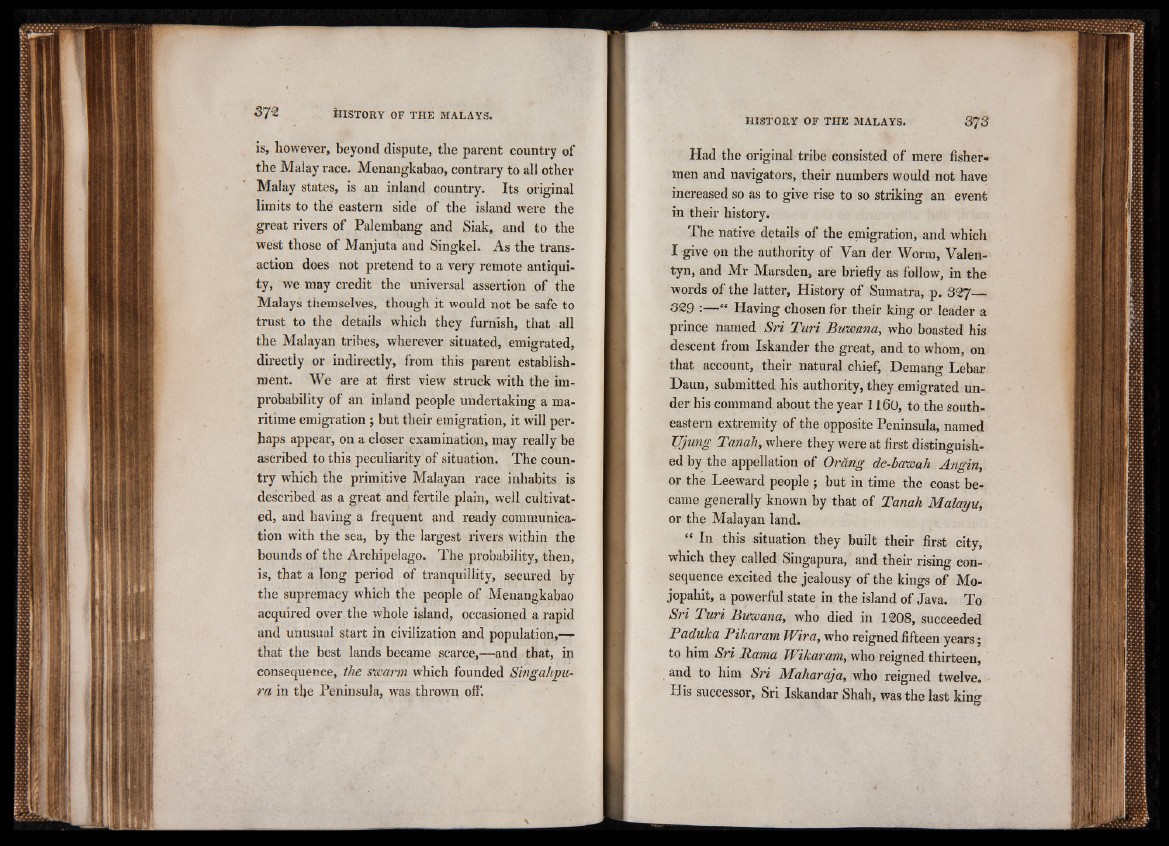
is, however, beyond dispute, the parent country of
the Malay race. Menangkabao, contrary to all other
Malay states, is an inland country. Its original
limits to the eastern side of the island were the
great rivers of Palembang and Siak, and to the
west those of Manjuta and Singkel. As the transaction
does not pretend to a very remote antiquity,
we may credit the universal assertion of the
Malays themselves, though it would not be safe to
trust to the details which they furnish, that all
the Malayan tribes, wherever situated, emigrated,
directly or indirectly, from this parent establishment.
We are at first view struck with the improbability
of an inland people undertaking a maritime
emigration ; but their emigration, it will perhaps
appear, on a closer examination, may really be
ascribed to this peculiarity of situation. The country
which the primitive Malayan race inhabits is
described as a great and fertile plain, well cultivated,
and having a frequent and ready communication
with the sea, by the largest rivers within the
bounds of the Archipelago. The probability, then,
is, that a long period of tranquillity, secured by
the supremacy which the people of Menangkabao
acquired over the whole island, occasioned a rapid
and unusual start in civilization and population,—
that the best lands became scarce,—and that, in
consequence, the swarm which founded Singahyu*
ra in the Peninsula, was thrown off*.
Had the original tribe consisted of mere fisher-
men and navigators, their numbers would not have
increased so as to give rise to so striking an event
in their history.
The native details of the emigration, and which
I give on the authority of Van der Worm, Valen-
tyn, and Mr Marsden, are briefly as follow, in the
words of the latter, History of Sumatra, p. 827—
329 :—“ Having chosen for their king or leader a
prince named Sri Turi Buwana, who boasted his
descent from Iskander the great, and to whom, on
that account, their natural chief, Demang Lebar
Daun, submitted his authority, they emigrated under
his command about the year 1160, to the southeastern
extremity of the opposite Peninsula, named
Ujung Tanah, where they were at first distinguished
by the appellation of Orang de-bawah Angin,
or the Leeward people ; but in time the coast became
generally known by that of Tanah Malayu,
or the Malayan land.
“ In this situation they built their first city,
which they called Singapura, and their rising consequence
excited the jealousy of the kings of Mo-
jopahit, a powerful state in the island of Java. To
Sri Turi Buwana, who died in 1208, succeeded
Paduka Piharam Wira, who reigned fifteen years;
to him Sri Rama Wikaram, who reigned thirteen,
and to him Sri Maharaja, who reigned twelve.
His successor, Sri Iskandar Shah, was the last kins'